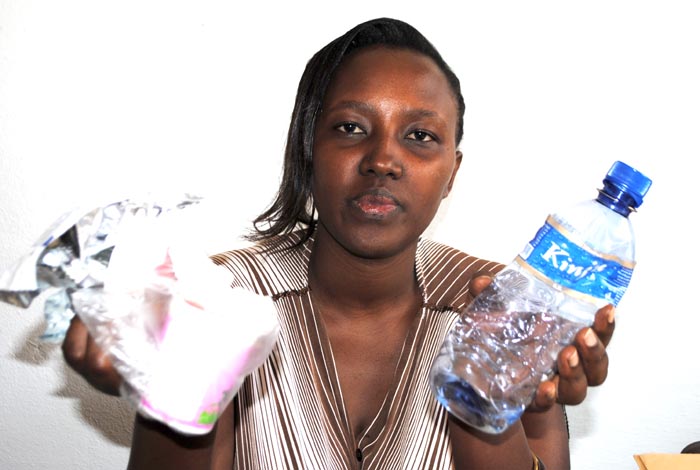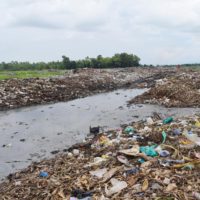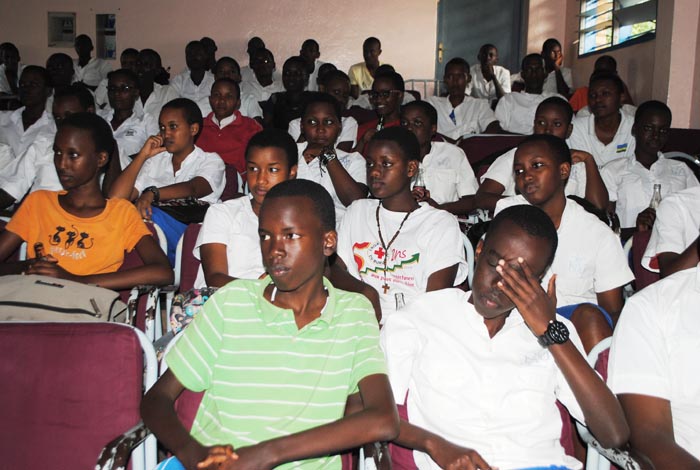For the sake of the environment protection, CTB (Belgium Technical Cooperation) has created a transit zone for household solid waste recovery at Kinama in its program of road-paving and solid waste management- by Lorraine Josiane Manishatse

Mireille Mizero, Assistant lecturer at the University of Burundi, Expert in Environmental Sciences, prevention and pollution remediation:“We must always prevent open burning because it is more and more hazardous since some products can cause cancer.”©Iwacu
For Aloys Nsabimana, a technical assistance agent at Kinama transit zone project for household solid waste recovery, the so-called project is very important because it will help Bujumbura citizens safeguard the environment and protect them against waste that often causes various diseases.
According to Beatrice Ciza another agent working at the place, the Kinama transit project is new; they are still trying it out and only work at Muyinga Quarter considered as a pilot area.“We have begun this work at least for two months. This transit zone has four agents who bring household waste and two other agents who divide the solid waste into categories so that they can handle them easily. There are eight categories: plastic objects, metal stuff, glasses, batteries, food waste, charcoal, plastic bags or sachets and fruit seeds, each category in its own place “she highlights. She also indicates that, they transform biodegradable waste into manure and coal, and will make selected fruit seed nurseries. Maze peels are used in traditional handcraft to make baskets.
Gaston Ntahomvukiye, an agent in charge of collecting contribution fees for road-paving and waste management program at Kinama, indicates that identified waste glasses will be recycled by Brarudi, the Burundi brewery, while plastic objects will be recycled by Savonor, a soap and oil Company in Burundi and plastic bags or sachets will be discarded at Mubone where the public dump is.
Wastes are different according to their physiochemical composition
Mireille Mizero, Assistant lecturer at the University of Burundi, Expert in Environmental Sciences, prevention and pollution remediation, explains that there are biodegradable wastes which should be transformed into combustible fuel, animal food and manure. And there are non-biodegradable wastes which are divided into many categories according to their physiochemical composition: there is common waste containing plastics, metals, glasses which can be recycled, and hazardous wastes containing batteries, flammable waste products like paint, perfume, insecticide and expired medicine bottles, which are not recycled and need to be treated very carefully.
She also mentions that there are two kinds of sachets, recycled and non- recycled ones. For those latter, it is not good to discard them anywhere on the grounds because they can pollute the soil as they may last more than 4000 years.
What measures should be taken?
For Mizero, Burundi government should prevent non-recyclable sachets to enter the country. Furthermore, for those which are already in the country, Burundians should follow the example of some foreign countries where there are people who make handbags or clothes from those used sachets.
As Burundi doesn’t have enough adequate means to recycle them, they should be crushed together and stored somewhere in a safe place until they may be recycled. She insists that people must be sensitized about the importance of putting wastes into dumpsters separately. They should be labeled or colored in order to facilitate the separation process.
“Dumpsters colored in red will contain common waste, in black hazardous waste and in green degradable waste. And it’s necessary to display them in the Kirundi language so that everybody can understand how to separate them “she explains. She concludes that we must always prevent open burning because it is more and more hazardous since some products can cause cancer.
















 IWACU Open Data
IWACU Open Data

